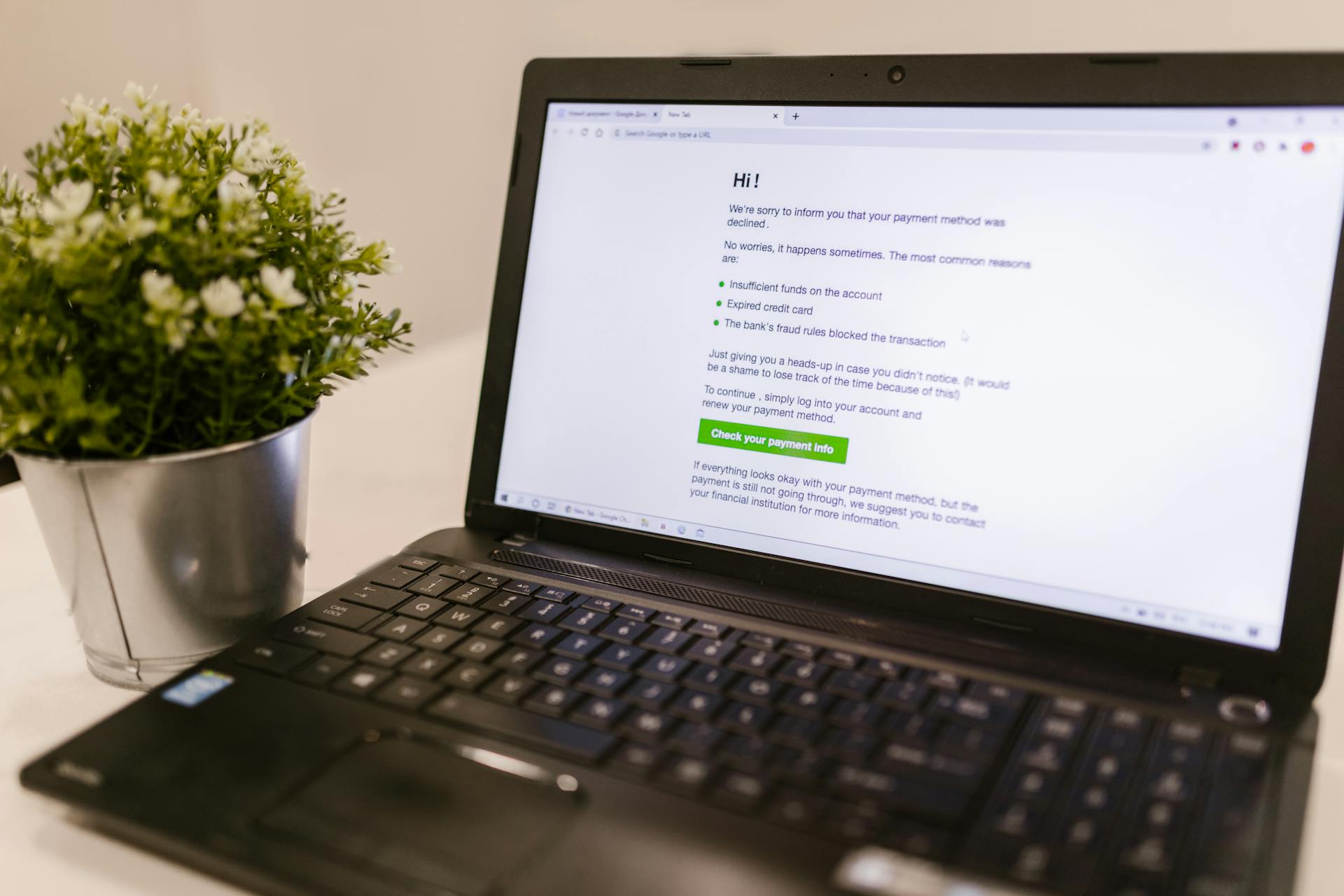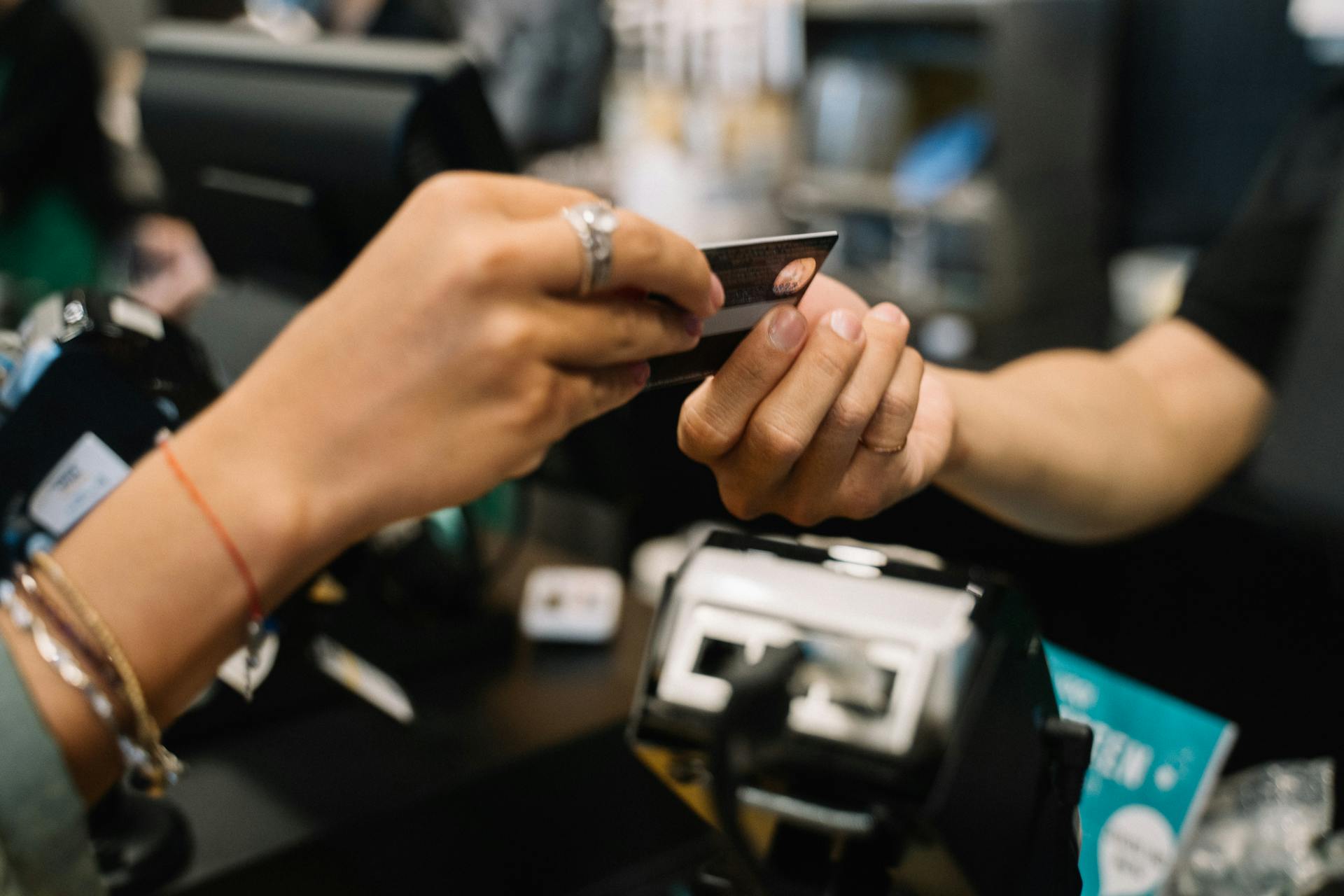
A cashier's check can be cancelled, but it's not always a straightforward process. A cashier's check can be cancelled by the issuing bank if it's a duplicate check or if the original check was forged.
The bank may require a written request and identification from the account holder to cancel the check. This is typically done to prevent unauthorized transactions.
Canceling a cashier's check can be a hassle, and it may take some time to resolve the issue. The bank may also charge a fee for cancelling the check.
Why Cancel a Check?
Canceling a cashier's check might be necessary in various circumstances. Although it offers security, situations may still arise where a cancellation is required.
You might need to cancel a cashier's check if you suspect fraudulent activity. This can prevent unauthorized transactions and protect your funds.
Transaction errors can also require cancellation. Mistakes such as incorrect amounts or payee names might need to be corrected by canceling and reissuing the check.
A lost or stolen cashier's check needs to be canceled immediately to protect your funds. This is a crucial step to prevent further unauthorized transactions.
If a transaction falls through, such as backing out of a home or car purchase, canceling the check becomes necessary. This can help avoid any potential financial complications.
Here are some common reasons to cancel a cashier's check:
- Fraudulent Activity
- Transaction Errors
- Lost or Stolen Checks
- Changed Purchase Plans
Canceling Process
Canceling a cashier's check involves several steps, and it's essential to act quickly. The issuing bank needs to verify the request to ensure the check hasn't been cashed or deposited.
To cancel a cashier's check, you'll need to provide specific documentation to the bank, including proof of identity, the original receipt, check details, and a Declaration of Loss form if the check is lost or stolen.
Here's a step-by-step guide to canceling a cashier's check:
- Contact the Bank: Reach out to the bank that issued the cashier's check as soon as possible.
- Complete a Declaration of Loss: If the check is lost or stolen, submit a Declaration of Loss form.
- Wait for Verification: The bank will verify the status of the check.
- Issue a Replacement or Refund: After verification, the bank will either issue a replacement check or provide a refund.
Keep in mind that cancellation can take time, and some banks may charge fees for canceling cashier's checks. The bank may also require additional paperwork, and you'll need to be patient during the process.
Risks of Checks
Canceling a check can be a hassle, and there are some risks you should be aware of. Processing delays are a common issue, as the bank needs to investigate before canceling the check.
Some banks charge fees for canceling checks, which can add to the inconvenience. These fees can range from a few dollars to a significant amount.
Legal complications can also arise if a check is involved in a dispute, making the cancellation process even more challenging. In some cases, an online signature generator may be required, which can slow down the resolution.
Missing the cancellation window can make it difficult to cancel a check, as some banks have specific timeframes for cancellation. These timeframes can vary from bank to bank, so it's essential to check with your bank for their policies.
Steps Involved
Canceling a cashier's check involves several steps, and it's essential to follow them carefully to avoid any issues. The process starts by contacting the bank that issued the check as soon as possible.

To initiate the cancellation process, you'll need to provide proof of identity, such as a government-issued ID like a driver's license or passport. This is a crucial step, as it helps the bank verify your identity.
You'll also need to submit the original receipt issued when purchasing the cashier's check. This document serves as proof of purchase and helps the bank track the check's status.
The check details, including the check number, amount, and payee details, should also be provided to the bank. This information is necessary for the bank to verify the check's status and proceed with the cancellation process.
If the check is lost or stolen, you'll need to submit a Declaration of Loss form. This form legally declares the check lost and helps the bank understand the situation.
Here are the steps involved in canceling a cashier's check:
- Contact the Bank: Reach out to the bank that issued the cashier’s check.
- Complete a Declaration of Loss: If the check is lost or stolen, submit a Declaration of Loss form.
- Wait for Verification: The bank will verify the status of the check.
- Issue a Replacement or Refund: After verification, the bank will either issue a replacement check or provide a refund.
The bank may require additional forms to be completed, so be sure to ask about any specific requirements. This process can take up to 90 days if an indemnity period is required, so be patient and follow up with the bank if necessary.
Bank Policies and Time Constraints
Banks often have a limited timeframe during which you can cancel a cashier's check, usually around 90 days.
Missing this window can complicate cancellation efforts, potentially leading to legal issues or additional fees.
Some banks may require a waiting period before processing the cancellation, so it's essential to check with your bank first.
Failing to act within the 90-day window can make the cancellation process more complicated, and missing it altogether may prevent you from canceling the check at all.
Each bank has its own procedures for canceling a cashier's check, and some might issue a replacement check rather than a refund, with fees applying for cancellation services.
Keep these time constraints and bank policies in mind to avoid delays and successfully complete the cancellation process within the permitted timeframe.
Stopping Payment
Stopping payment on a cashier's check involves requesting the issuing bank to halt payment to the recipient. Banks do not typically stop payments on these checks like they do with personal checks.
In cases of theft or fraud, banks might offer a resolution, requiring an affidavit or a Declaration of Loss form. This process can take up to 90 days, depending on the bank's policies and regulatory requirements.
Stopping payment on a lost cashier's check is generally not possible, but banks may allow you to initiate a stop payment over the phone or online. Be aware that the bank may still require you to purchase an indemnity bond and pay a fee for stopping payment.
To stop payment on a cashier's check, you'll need to contact your bank to find out what its policies are. The bank may require a Declaration of Loss and could take up to 90 days to stop the payment, depending on their investigation.
Here are some common reasons why you might want to stop payment on a cashier's check:
- Fraudulent Activity: If you suspect the check might be involved in fraud, canceling it can prevent unauthorized transactions.
- Transaction Errors: Mistakes such as incorrect amounts or payee names might require cancellation and reissuance.
- Lost or Stolen Checks: A lost or stolen cashier's check needs to be canceled immediately to protect your funds.
- Changed Purchase Plans: If a transaction falls through, such as backing out of a home or car purchase, canceling the check becomes necessary.
Stopping Payment
Stopping payment on a cashier's check is not as straightforward as stopping payment on a personal check. Banks typically don't stop payments on cashier's checks, but in cases of theft or fraud, they might offer a resolution.
The process can take up to 90 days, depending on the bank's policies and regulatory requirements. To initiate this process, you may need to provide an affidavit or a Declaration of Loss form, confirming that the check has not been cashed.
You can try to stop payment on a lost cashier's check, but it's not a guarantee. Banks may allow you to initiate a stop payment over the phone or online, but their policies can vary. It's a good idea to call your bank to find out what they require.
Stopping payment on a cashier's check can come with a fee, and you might need to purchase an indemnity bond. Be prepared to pay for this service, as the amount will depend on the bank.
You might need to cancel a cashier's check due to various reasons, including fraudulent activity, transaction errors, lost or stolen checks, or changed purchase plans. These situations require immediate action to protect your funds.
Here are some common reasons to cancel a cashier's check:
- Fraudulent Activity: If you suspect the check might be involved in fraud, canceling it can prevent unauthorized transactions.
- Transaction Errors: Mistakes such as incorrect amounts or payee names might require cancellation and reissuance.
- Lost or Stolen Checks: A lost or stolen cashier's check needs to be canceled immediately to protect your funds.
- Changed Purchase Plans: If a transaction falls through, such as backing out of a home or car purchase, canceling the check becomes necessary.
Can I Get a Refund on a Check?
Canceling a cashier's check can be necessary in various circumstances. Although it offers security, situations may still arise where a cancellation is required.
In some cases, you may be able to get your money back on a cashier's check, but it's not a straightforward process. You will need to file a claim with your bank or purchase an indemnity bond to get the money back.
You cannot just get your money back on a cashier's check since the check has been paid. This means you'll need to take further action to recover your funds.
Filing a claim with your bank or purchasing an indemnity bond may come with fees associated with this process. A waiting period may also be required before you can receive your refund.
Explore further: Can I Cash My Auto Insurance Claim Check
Canceling a Check
Canceling a cashier's check can be a necessary step in certain situations, but it's essential to be aware of the potential challenges involved. You might need to cancel a cashier's check if you suspect fraudulent activity, transaction errors, lost or stolen checks, or if a purchase falls through.
The bank may charge fees for canceling a cashier's check, and the process can take time due to investigations. Additionally, there may be specific timeframes within which checks can be canceled, so it's crucial to act quickly.
To cancel a cashier's check, you'll typically need to provide documentation to the bank, including proof of identity, the original receipt, check details, and a declaration of loss if the check is lost or stolen. Some banks may also require additional paperwork.
If you're canceling a cashier's check due to a lost or stolen check, you may need to purchase an indemnity bond to protect the bank from potential losses. This can be a costly and time-consuming process.
Here are some common reasons to cancel a cashier's check:
- Fraudulent Activity: If you suspect the check might be involved in fraud, canceling it can prevent unauthorized transactions.
- Transaction Errors: Mistakes such as incorrect amounts or payee names might require cancellation and reissuance.
- Lost or Stolen Checks: A lost or stolen cashier's check needs to be canceled immediately to protect your funds.
- Changed Purchase Plans: If a transaction falls through, such as backing out of a home or car purchase, canceling the check becomes necessary.
Frequently Asked Questions
Can someone reverse a cashier's check?
A financial institution can cancel or issue a stop payment on a cashier's check in certain circumstances, but you'll need to fill out paperwork. However, reversing a cashier's check is possible, but it's not a straightforward process.
Sources
- https://bluenotary.us/can-you-cancel-a-cashiers-check/
- https://www.thebalancemoney.com/lost-or-stolen-cashier-s-check-no-longer-need-it-315028
- https://www.sweepstakesbible.com/blog/knowledge/can-you-cancel-a-cashiers-check/
- https://www.investopedia.com/personal-finance/how-handle-lost-cashiers-check/
- https://www.linkedin.com/pulse/can-you-cancel-cashiers-check-everything-need-know-bluenotary-rdvxc
Featured Images: pexels.com


